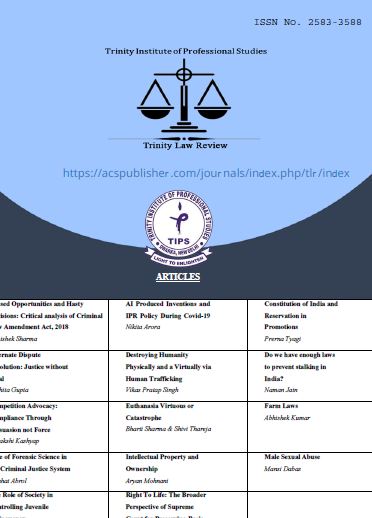Children as Domestic Workers: Legal Challenges
DOI:
https://doi.org/10.48165/tlr.2023.3.2.01Keywords:
Children, Constitution, domestic help, legal rights, legislative frameworkAbstract
The involvement of children in the domestic work which is categorised under unorganised sector of labour is an extensive and growing worldwide phenomenon. Specifically in the case of India, the preamble of the Constitution embarks on the word ‘We’ and imparts equal rights to all the citizens of the country without any discrimination. Some special provisions were cautiously incorporated in the Constitution for protection of the children like, Articles 21A (Right to Education), 23 (Protection against trafficking & other forms of forced labour), 24 (prohibition of employment of children in factories etc.), 39(e) (Protection from abuse) etc. In this unorganised sector almost 40 per cent work is performed by the children who mostly migrate from rural to urban areas. To meet the basic necessities of life, these children are forced to work in private households under severe conditions such as long and unregulated working hours, employment subject to employer’s mercy, and high level of insecurity. They remain vulnerable as they work in unorganised sector that is constituted mainly by the marginalised people, living mostly in slums in shabby conditions, and remain subject to exploitation in the absence of specific legislative frameworks to regulate their working conditions. These working conditions impinge on the fundamental rights of the children guaranteed by the Constitution of India. Recently, some measures have been initiated to bring this sector in the legislative ambit, under the Code on Social Security which defines the term “wage worker”, including the domestic workers. A reality check indicates there is not a single provision in this Act to assure social security to the children working as domestic help; instead, it excludes them from the various provisions of labour laws. This paper attempts to outline the legislative provisions at national as well as international level for the protection of children, challenges faced by the children working as domestic workers, role of judiciary to curb the problem and outline the policy postures required to adopt an inclusive approach to afford social justice and facilitate their economic and social inclusion as per the spirit of the Constitution.




